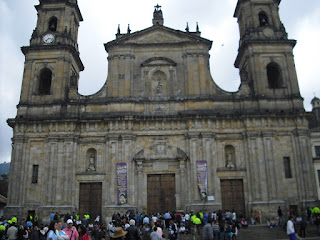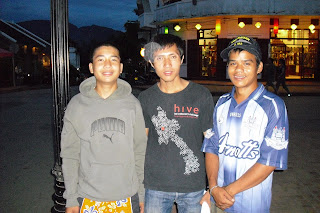We’ve written before about the simple pleasures that we enjoy here in Bogotá.* In the last half year or so there have been two important additions to that list to which we must give due mention. Indeed, considering the time and money we’ve spent (well spent that is, most of the time) in both locations it would be remiss of us not to pay them homage.
They both fall into the tienda bar category – that is cheap-and-cheerful, rough-and-ready places to consume a few beers. Perhaps it’s an Irish trait, but no matter where we are in the world we always like to find a place (or two) we can call our local.
Initially, here in Bogotá’s La Candelaría district, we stumbled upon the popular, fairly reasonably priced Doña Ceci’s. It fulfilled its purpose for a while, but after devoting a nice chunk of time to the place, it became a little disappointing that we remained just another number, another ‘foreigner with money’ to the rather cold, tacaña owner.
They both fall into the tienda bar category – that is cheap-and-cheerful, rough-and-ready places to consume a few beers. Perhaps it’s an Irish trait, but no matter where we are in the world we always like to find a place (or two) we can call our local.
 |
| Elusive Lucio – keeping the beer flowing. |
We don’t demand a lot, but a little appreciation and recognition from time to time that we’re good customers wouldn’t go astray – what a local should, at the very least, be about. Alas, with Doña Ceci, this was never forthcoming.
However, the tiendas where we now like to relax at the weekends (and the odd weekday) score high on those points and more. Both places are such bog-standard, Colombian drink holes that they don’t even have a name – at least not an obvious one that we’ve noticed. Thus, we’ve had to christen them ourselves (and regularly continue to wet the baby’s head at that).
So there’s Up the hill due to its location which is, predictably enough, at a bit of a higher altitude than where we live, on the borders of the supposedly not-that-safe barrios of Egipto and Belén south of the city centre.
However, the tiendas where we now like to relax at the weekends (and the odd weekday) score high on those points and more. Both places are such bog-standard, Colombian drink holes that they don’t even have a name – at least not an obvious one that we’ve noticed. Thus, we’ve had to christen them ourselves (and regularly continue to wet the baby’s head at that).
So there’s Up the hill due to its location which is, predictably enough, at a bit of a higher altitude than where we live, on the borders of the supposedly not-that-safe barrios of Egipto and Belén south of the city centre.
Then there’s Nazi bar which, perhaps not so predictably, has nothing to do with – in any meaningful sense anyway, as far as we’re aware or concerned – the fascist movement that found its home in Germany in the 1930s and 40s.
It’s been dubbed that because the very affable twenty-something-year-old owner, Lucio, has for some reason that we’ve yet to ask him, a faint swastika tattoo on his hand. Considering he doesn’t exactly resemble nor have the ethnic background of a typical Nazi, we like to think that the symbol for him represents one of its non-violent meanings – ‘to be good’.
In any case, actions speak louder than words (or symbols) and Lucio has only ever been a complete gentleman to us. Indeed, of late he has adopted the Irish custom of the lock-in after hours. A free grande (that’s a 750ml bottle of beer, Poker being our preferred option) on our birthday was also very much appreciated. Small things, but they make a difference.
In any case, actions speak louder than words (or symbols) and Lucio has only ever been a complete gentleman to us. Indeed, of late he has adopted the Irish custom of the lock-in after hours. A free grande (that’s a 750ml bottle of beer, Poker being our preferred option) on our birthday was also very much appreciated. Small things, but they make a difference.
Now, while Nazi’s grandes are a tad more expensive than our other local (3,000 pesos versus 2,500 pesos or €1.20 compared to €1 if you like – every little helps) Lucio’s friendly demeanour and appreciation to have us as patrons (how privileged he is) more than makes up for that. It also must be said he does benefit from a location advantage – he’s just a stone’s throw away from our residence.
As for Up the hill, while the cheaper beer may have been the initial strongest pulling point, the treatment we receive, not just from the extremely friendly Paisa-blooded** owners and staff but the other Bogotáno regulars who drink there too, means that we feel bad if we don’t make a visit at least once a week.
Indeed, the chief owner is almost like a mother figure to us – in a good sense, that is. Not only was there free beer for our birthday, but a cake to boot. As for the other revellers who frequent the place, it’s rare we leave without getting at least one free drink landed on our table; all this from one of the city’s "poorer" regions, especially so when compared to the exclusive north.
So much have these places become what you might call our home from home, the constant salsa and vallenato music that’s played in them is almost becoming likeable for us. We’ve even been known to do a spot of salsa-ing once we’re merry enough (for a greater discussion about our Colombian dancing exploits, see http://bit.ly/S7A8eS).
All that’s missing in both places are a few prettier chicas from time to time – perhaps the ones that generally frequent the plush north could visit, just leave the attitude and arrogance at home. We can dream, can’t we?
______________________
*'Bogotá's simple pleasures' http://bit.ly/Uzc3lk.
**Paisa is the name given to a person hailing from north-west Colombia, specifically the departments of Antioquia, Caldas, Quindío and Risaralda.
 |
| Fun & games Up the hill. Is there anybody serving, though? |
Indeed, the chief owner is almost like a mother figure to us – in a good sense, that is. Not only was there free beer for our birthday, but a cake to boot. As for the other revellers who frequent the place, it’s rare we leave without getting at least one free drink landed on our table; all this from one of the city’s "poorer" regions, especially so when compared to the exclusive north.
So much have these places become what you might call our home from home, the constant salsa and vallenato music that’s played in them is almost becoming likeable for us. We’ve even been known to do a spot of salsa-ing once we’re merry enough (for a greater discussion about our Colombian dancing exploits, see http://bit.ly/S7A8eS).
All that’s missing in both places are a few prettier chicas from time to time – perhaps the ones that generally frequent the plush north could visit, just leave the attitude and arrogance at home. We can dream, can’t we?
______________________
*'Bogotá's simple pleasures' http://bit.ly/Uzc3lk.
**Paisa is the name given to a person hailing from north-west Colombia, specifically the departments of Antioquia, Caldas, Quindío and Risaralda.





